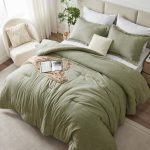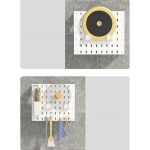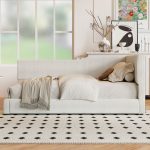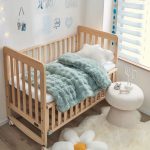Benefits of Organic Bedding
Choosing organic bedding is not just a trend; it offers numerous benefits that affect our health, the environment, and even our wallet in the long run. By understanding these benefits, you can make an informed decision about whether organic bedding is the right choice for your home.

Health Advantages
Organic bedding provides clear health advantages over traditional options. Made without harmful chemicals and pesticides, organic bedding reduces the risk of skin irritations and allergies. These natural materials allow for better air circulation, which can help in regulating body temperature during sleep. The absence of synthetic substances means you’re not breathing in volatile organic compounds (VOCs) while you sleep, contributing to better overall air quality in your bedroom.
Environmental Impact
The production of organic bedding has a significantly lower environmental impact than its non-organic counterparts. Organic farming practices for materials like cotton and bamboo preserve soil health and biodiversity. They typically use less water and do not involve toxic pesticides or fertilizers that can harm wildlife or contaminate water sources. By choosing organic, you are supporting sustainable agriculture that is kinder to our planet.
Durability and Longevity
Although often perceived as more expensive, organic cover sets can be a wiser investment in the long run. Natural fibers are known for their durability and strength, which means that organic bedding can withstand many washes without breaking down or losing its shape. This inherent sturdiness translates to a longer lifespan, reducing the need for frequent replacements and thus saving money over time.
Understanding Organic Certification
Choosing organic bedding often comes with a search for reassurance that the products are truly organic. One fundamental element of this assurance comes from organic certification.
What Does ‘Organic’ Mean in Bedding?
In the context of cover sets, ‘organic’ refers to the way the raw materials, such as cotton, bamboo, or wool, are grown and processed. For a product to be labeled as organic, it must be free from synthetic pesticides, fertilizers, and other harmful chemicals throughout its growth and manufacturing phases. The goal is to produce materials in ways that respect the Earth and ensure consumer safety.
Types of Certifications for Organic Bedding
When you’re in the market for organic cover sets, you’ll encounter various certifications that validate the organic claims of a product.
- Global Organic Textile Standard (GOTS): This is one of the leading textile processing standards for organic fibers. It includes ecological and social criteria backed by independent certification.
- OEKO-TEX Standard 100: While not exclusively for organic items, this certification ensures textiles are free from harmful substances.
- USDA Organic: Commonly seen for food, this label can also apply to cotton grown without synthetic chemicals or genetically modified seeds.
- Made Safe: This certification screens for ingredients known to harm human health and the environment.
Look for these labels to ensure the organic bedding you choose meets high environmental and health standards.
Comparing Organic vs Non-Organic Bedding Materials
When deciding between organic and non-organic cover sets, it’s crucial to understand the differences. This choice impacts not just comfort but also health and environmental footprint.
Key Differences
The main differences lie in the materials and the process of making the cover sets. Organic bedding uses natural fibers like organic cotton or bamboo, free from synthetic chemicals. Non-organic bedding often contains synthetic fabrics like polyester, which come from petrochemicals. The organic options are more breathable and eco-friendly, while non-organic fabrics can trap heat and involve less sustainable practices.
Organic bedding is also less likely to cause skin irritation, as it does not contain allergens or harsh chemicals. In contrast, non-organic cover sets can expose you to a range of chemicals during manufacturing and in your home. The durability of organic materials also tends to be higher, which can save you money in the long run.
The Chemicals in Traditional Bedding
Traditional, non-organic cover sets materials are often treated with a slew of chemicals. Flame retardants, waterproofing agents, and wrinkle-resistant treatments can release VOCs over time. These chemicals can contribute to indoor air pollution and long-term health issues. Dyes and other chemical finishes used in non-organic cover sets can also be harsh on the skin.
Choosing organic bedding reduces the exposure to these potential risks. Organic fibers come without these harmful substances, making them a safer option for a peaceful rest. Keep these differences in mind as you make an informed choice for your bedding materials.

Popular Types of Organic Bedding Materials
When exploring options for organic cover sets, you will find a variety of materials available. Each offers unique benefits, and understanding these can help you choose the best fit for your needs.
Organic Cotton
Organic cotton is one of the most popular choices for organic cover sets. It’s soft, durable, and breathable, making it perfect for a comfortable night’s sleep. Unlike conventional cotton, organic cotton grows without toxic pesticides or synthetic fertilizers. This makes it kinder to the skin and the environment.
Wool and Latex
Wool is another excellent option for organic cover sets. It naturally regulates temperature, keeping you warm in the winter and cool in the summer. Organic wool comes from sheep that are raised without harmful chemicals. Natural latex, often used in pillows and mattress toppers, provides comfort and support. It comes from the sap of rubber trees and does not contain synthetic materials.
Bamboo and Other Sustainable Fibers
Bamboo bedding is gaining popularity due to its softness and eco-friendly qualities. Other sustainable fibers include hemp and linen, which are durable and have low environmental footprints. These materials not only provide comfort but also ensure that your choice is beneficial for the planet.
How to Choose Quality Organic Bedding
Choosing quality organic bedding ensures comfort and aligns with eco-friendly values. Here’s how to select the best organic bedding for your home.
Reading Labels and Certifications
Start by reading the labels closely. Look for the certifications mentioned earlier in this blog, like GOTS, OEKO-TEX Standard 100, and USDA Organic. These labels guarantee that the bedding meets strict organic standards. If the organic bedding has a ‘Made Safe’ certification, it indicates it’s free from substances harmful to humans and the environment. Remember, not all certifications are the same, and some are stricter than others. Opt for bedding with multiple certifications when possible.
Considering Thread Count and Weave
Thread count refers to the number of threads per square inch of fabric. A higher thread count usually means softer bedding, but this isn’t always the case. For a good balance, seek organic bedding with a thread count within the range of 200 to 400. This ensures softness and durability without compromising breathability. The weave of the fabric also affects comfort; for instance, a sateen weave is silky and lustrous, while a percale weave feels crisp and cool. Choose a weave based on your personal preference and the climate you live in.
Caring for Your Organic Bedding
Caring for your organic bedding properly extends its life and maintains its benefits. Organic materials need special attention to keep them at their best.
Washing and Maintenance Tips
To maintain the quality of your organic bedding, follow these tips:
- Use Mild Detergent: Choose a mild, eco-friendly detergent to avoid harsh chemicals.
- Cold Water Wash: Always wash your organic bedding in cold water. It preserves fabric integrity and saves energy.
- Gentle Cycle: Use the gentle cycle on your washing machine to protect the natural fibers.
- Avoid Bleach and Fabric Softeners: These can degrade organic fibers and reduce the bedding’s lifespan.
- Air Dry When Possible: Air drying is the best option. It’s gentle and eco-friendly. If you must use a dryer, choose a low heat setting.
By following these guidelines, your organic cover sets will remain soft, durable, and comfortable for years.
The Lifecycle of Organic Bedding
Understanding the lifecycle of organic cover sets can help you make sustainable choices:
- Production: It starts with sustainable farming of natural fibers like organic cotton or bamboo.
- Use: With proper care, organic bedding can last longer than non-organic options.
- End of Life: Eventually, organic cover sets will wear out. When it does, consider recycling or donating it. Some organic materials are biodegradable and can be composted, reducing environmental impact.
By considering the entire lifecycle, you can maximize the eco-friendly benefits of your cover sets choice.

Where to Buy Organic Bedding
Choosing the right place to buy organic bedding is crucial for getting high-quality and genuine organic products. Here are some insights on where to find them.
Trusted Retailers and Brands
To ensure you get authentic organic bedding, look for well-known retailers and brands. Many companies specialize in organic and eco-friendly products. Seek out brands with strong reputations for quality and sustainability. These brands often use certifications like GOTS or USDA Organic to verify their products. Check out local health and eco stores, department stores, or specialist bedding shops. They typically offer a range of certified organic cover sets options.
Online Shopping Tips for Organic Bedding
Online shopping for organic bedding can be convenient and often provides more variety. When browsing online:
- Research the Seller: Make sure the seller is reputable and has good reviews for their organic products.
- Verify Certifications: Check product listings for certification labels to ensure the bedding’s organic status.
- Read Product Descriptions: Look for details about the materials and care instructions.
- Check Return Policies: Understand the return policy in case the product doesn’t meet your expectations.
- Compare Prices: Look at different websites to find the best deal on quality organic bedding.
Buying organic cover sets is a wise choice for your health, the environment, and long-term savings. Take your time to find trusted retailers and follow these tips to make your online shopping experience successful.









